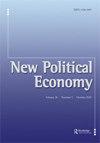市场对欧洲社会再生产和跨国劳动力流动的影响
IF 3.8
2区 经济学
Q1 ECONOMICS
引用次数: 0
摘要
市场深入到社会再生产的过程和后果是什么?在以新自由主义化和跨国化为基础的欧洲化背景下,这些发展是如何迫使劳动力流动的?为了考虑这些问题,我们将社会再生产理论和欧洲资本不平衡和综合积累的框架应用于英国、波兰和乌克兰及其食品生产、住房建设和护理部门的分析。我们探讨了在这三个由劳动力流动相互联系的国家中,在这三个对社会再生产至关重要的领域中,变革不仅影响了提供食物、住房和护理的行业,而且至关重要的是,重塑了社会再生产的轮廓。将社会再生产理论化为市场、国家和家庭供给的连续体,我们概述了它在欧洲化的特定集群中的转变,并描述了流动性是如何被市场推动并推进到食品、住房和护理领域的。我们认为,市场驱动的跨国社会再生产是由各种矛盾构成的,这些矛盾源于再生产劳动对价值规律的日益服从,逐渐剥夺了家庭对繁荣的承诺——这是一个复杂的过程,通过我们对政治经济学的女权主义批评可以看出。本文章由计算机程序翻译,如有差异,请以英文原文为准。
Market-reach into social reproduction and transnational labour mobility in Europe
What are the processes and consequences of markets reaching deeper into social reproduction? How do these developments, in the context of Europeanisation underpinned by neoliberalisation and transnationalisation, compel labour mobility? To consider these questions we apply social reproduction theory and the framework of uneven and combined accumulation of capital in Europe to the analysis of the UK, Poland and Ukraine and their food production, housing construction and care provision sectors. We explore how transformations, in these three countries interconnected by labour mobilities and in these three domains key to social reproduction, not only a ff ect the industries that supply food, housing and care, but, crucially, redraw the contours of social reproduction. Theorising social reproduction as a continuum of market, state and household provisioning, we outline its transformation within the speci fi c constellation of Europeanisation and delineate how mobility is both propelled by and advances market-reach into food, housing and care. We argue that market-driven transnational social reproduction is constituted by contradictions stemming from the deepening subordination of reproductive labour to the law of value, progressively depriving households of the promise of prosperity - a complex process that is made visible by our feminist critique of political economy.
求助全文
通过发布文献求助,成功后即可免费获取论文全文。
去求助
来源期刊

New Political Economy
Multiple-
CiteScore
10.10
自引率
9.50%
发文量
41
期刊介绍:
New Political Economy aims to create a forum for work which combines the breadth of vision which characterised the classical political economy of the nineteenth century with the analytical advances of twentieth century social science. It seeks to represent the terrain of political economy scholarship across different disciplines, emphasising original and innovative work which explores new approaches and methodologies, and addresses core debates and issues of historical and contemporary relevance.
 求助内容:
求助内容: 应助结果提醒方式:
应助结果提醒方式:


